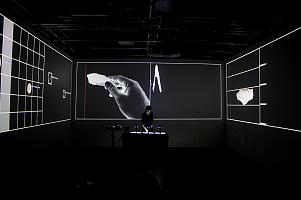MPhil/PhD
Arts & Computational Technology
Content navigation menu
Why study MPhil/PhD Arts & Computational Technology at Goldsmiths
This is the only programme in the University of London in which students can include creative work and an arts-based context of their practice within the distinctive field of arts and creative technologies.
- The opportunities for artists and technologists working in artistic domains have long encountered difficulties in finding appropriate ways to ‘measure’ artistic practice in ‘practice-based research’ terms. The aim of the programme is to support students in their creation of new forms of artistic expression, and in their invention and application of new technologies that help make the art form possible.
- This programme will allow you to take a novel and personal path of exploration. This path will be determined by the shifts you make between artistic, technical, practical, conceptual and theoretical domains in relation to your own unique vision.
- You will have two supervisors (one from arts practice, and one from computer science), and can attend weekly PhD research seminars where you can present your findings to peers and staff; you are expected to give two presentations per year.
- You also present your work Goldsmiths-wide through interdisciplinary Graduate School seminars and at Spring Review week.
- We have established a forum with the Creativity and Cognition studios at the University of Technology, Sydney for characterising practice situated across arts and computational technology, which offers the potential for collaborative research.
Assessment is by:
- Written thesis (60,000 - 80,000 words)
- Practical/technological component in an appropriate form
Contact the department
If you have specific questions about the degree, contact Akshi Kumar.
Length
3-4 years full-time or 4-6 years part-time
Entry requirements
Normally upper-second-class honours degree in a creative practice (eg art, design, music, technology, social sciences) or computer-based discipline (including studio arts) or an MA/MFA and/or equivalent technical and artistic experience in arts and computational technology. See additional info below
Fees
Home - full-time: £4786
Home - part-time: £2393
International - full-time: £18560
Department
Entry requirements
Normally an upper second class honours degree in a creative practice (eg art, design, music, technology, social sciences) or computer-based discipline (including studio arts) or an MA/MFA and/or equivalent technical and artistic experience in arts and computational technology.
You should normally be competent in the language and applications of working with technologies as appropriate to your practice.
International qualifications
We accept a wide range of international qualifications. Find out more about the qualifications we accept from around the world.
If English isn’t your first language, you will need an IELTS score (or equivalent English language qualification) of 7.0 with a 7.0 in writing and no element lower than 6.5 to study this programme. If you need assistance with your English language, we offer a range of courses that can help prepare you for postgraduate-level study.
You'll research
On this unique programme you will work on new forms of artistic expression, and the invention and application of new technologies that help make the art form possible. Your research will allow you to take a personal path of exploration, determined by the shifts you make between artistic, technical, practical, conceptual and theoretical domains in relation to your own vision.
How to apply
Apply directly to Goldsmiths using our online application system
We advise you to get in touch with the programme contact, listed above before you apply. It may also be possible to arrange an advisory meeting.
Before you start at Goldsmiths, the actual topic of your research has to be agreed with your proposed supervisor, who will be a member of staff active in your general field of research. The choice of topic may be influenced by the current research in the department or the requirements of an external funding body.
If you wish to study on a part-time basis, you should also indicate how many hours a week you intend to devote to research, whether this will be at evenings or weekends, and for how many hours each day.
Before submitting your application you'll need to have:
- Details of your education history, including the dates of all exams/assessments
- The email address of your referee who we can request a reference from, or alternatively an electronic copy of your academic reference
- Contact details of a second referee
- A personal statement – this can either be uploaded as a Word Document or PDF, or completed online. Please see our guidance on writing a postgraduate statement
- If available, an electronic copy of your educational transcript (this is particularly important if you have studied outside of the UK, but isn’t mandatory)
- Details of your research proposal
- A portfolio of your practical work (see below for details)
You'll be able to save your progress at any point and return to your application by logging in using your username/email and password.
When to apply
We accept applications from October for students wanting to start the following September.
We encourage you to complete your application as early as possible, even if you haven't finished your current programme of study. It's very common to be offered a place conditional on you achieving a particular qualification.
If you're applying for external funding from one of the Research Councils, make sure you submit your application by the deadline they've specified.
Research proposals
Along with your application and academic reference, you should also upload a research proposal at the point of application.
This should be in the form of a statement of the proposed area of research and should include:
- Delineation of the research topic
- Why it has been chosen
- An initial hypothesis (if applicable)
- A brief list of major secondary sources
Submitting your portfolio
We prefer that you send up to 20 images (via the online application system) as your portfolio.
However, if you wish to post your portfolio, do so on a CD (Mac compatible) saved as JPG, or on DVD as a PAL format video showreel of no longer than 10 minutes (please do not send QuickTime movies; only DVD format).
Supporting material should be securely packaged and clearly labeled with your name and address; Goldsmiths cannot accept responsibility for any loss/damage.
Post your portfolio to: MPhil & PhD Arts & Computational Technology Portfolios, Admissions Office, Goldsmiths, New Cross, London SE14 6NW.
You must write 'MPhil & PhD Arts & Computational Technology Portfolio' and your name on the outside of the envelope so that it can be matched with your application.
Only complete applications together with portfolios can be considered. We examine portfolios, and may then invite you to attend an interview. We'll invite international students who are invited for an interview, but can't attend Goldsmiths, for an interview via Skype.
You'll be able to arrange for collection of your portfolio up to three months after receiving a decision or by 31 July at the latest. Due to space limitations, portfolios not collected by this date will be disposed of.
Selection process
Admission to many programmes is by interview, unless you live outside the UK. Occasionally we'll make candidates an offer of a place on the basis of their application and qualifications alone.
Fees and funding
Annual tuition fees
These are the PG fees for students starting their programme in the 2024/2025 academic year.
- Home - full-time: £4786
- Home - part-time: £2393
- International - full-time: £18560
If your fees are not listed here, please check our postgraduate fees guidance or contact the Fees Office, who can also advise you about how to pay your fees.
It’s not currently possible for international students to study part-time under a student visa. If you think you might be eligible to study part-time while being on another visa type, please contact our Admissions Team for more information.
If you are looking to pay your fees please see our guide to making a payment.
Funding opportunities
Department of Computing Alumni Fee Waiver PhD Scholarship
In order to encourage world-leading research activity within the Department of Computing, we're pleased to offer a scholarship to alumni who wish to pursue a PhD at Goldsmiths. The scholarship provides a 30% fee waiver for three years (or part-time equivalent). We are looking for candidates that we believe, based on previous track record, have the potential to do high-profile and high-impact research, including high-quality publications or other outputs.
Eligibility criteria
The award is available to the following Goldsmiths graduates:
- UG (BA/BSc) and PG (MA/MSc) Home and international graduates (full-time and part-time) from the Department of Computing
- Offer holders for a PhD programme within the Department of Computing
Application
Please send the following to the Deputy Head of Computing, Dr Golnaz Badkobeh, copying in your supervisor:
- Your CV
- Your research proposal
- Email address of your supervisor (we will contact them for reference)
Other funding
Please check the Goldsmiths Scholarship Finder for other funding that you may be eligible to apply for.
Additional costs
In addition to your tuition fees, you'll be responsible for any additional costs associated with your course, such as buying stationery and paying for photocopying. You can find out more about what you need to budget for on our study costs page.
There may also be specific additional costs associated with your programme. This can include things like paying for field trips or specialist materials for your assignments.



